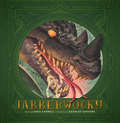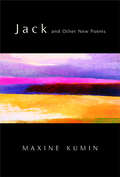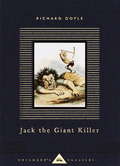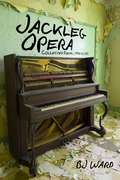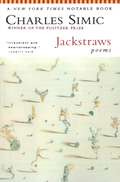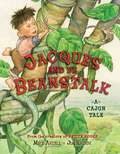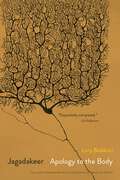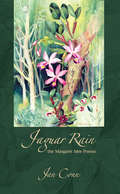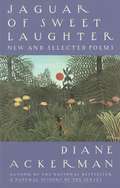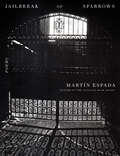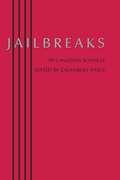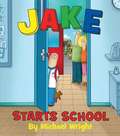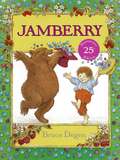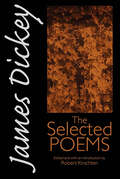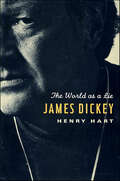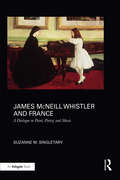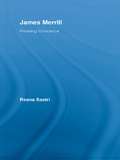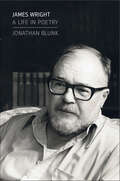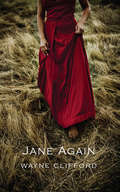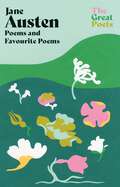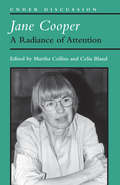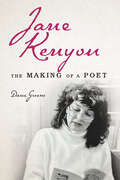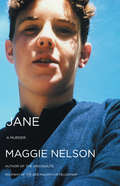- Table View
- List View
Jabberwocky: A Nonsense Coloring Book (Visions In Poetry Ser. #1)
by Lewis CarrollGet lost in this magical world full of beasts -- both familiar and fantastical -- with your children while reading and re-reading Jabberwocky year after year.'Twas brillig, and the slithy toves did gyre and gimble in the wabe; All mimsy were the borogoves, and the mom raths outgrabe.Lewis Carroll's most iconic seemingly nonsensical poem is brought to life like never before with award-winning illustrator Charles Santore's stunning renditions of a brave warrior who is on a mission to slay the dastardly Jabberwock. Get lost in this magical world full of beasts (both familiar and fantastical) with your children while reading and re-reading Jabberwocky year after year.
Jack and Other New Poems
by Maxine Kumin"Measured but warm, this work draws you in; it is another success among her many titles."--Library Journal In her fifteenth collection, Maxine Kumin meditates on the social consequences of such events as the bicentennial of the Civil War, and looks to poets writing from circumstances vastly different from her own. With death the central theme, poems of the body and praise songs for beloved animals explore how memory consoles and haunts.
Jack and The Beanstalk, with Benjy and Bubbles
by Ruth Lerner Perle Susan HorowitzA delightful retelling of the children's story Jack and the Beanstalk in rhyme. Includes picture desriptions.
Jack the Giant Killer
by Richard DoyleThe story of Jack, the intrepid boy whose courage and ingenuity defeated a host of many-headed giants, has been told to children for hundreds of years. In 1842, when he was just 18, Richard Doyle, whose natural talent for draftsmanship was matched by imaginative invention and a passion for legend and the grotesque, created a picture-book version of Jack the Giant Killer, with hand-written text and a watercolor within a pictorial border decorating every page. It has remained one of the most beloved versions of this timeless tale.In this new Everyman's edition, Doyle's vivid, wonderfully engaging illustrations have been enlarged and the text has been given greater legibility. It is a book that will satisfy both the child's delight in scariness, wonder, and magic, and the collector's pleasure in classic Victorian illustration.
Jackleg Opera: Collected Poems, 1990 to 2013 (Io Poetry Series #7)
by Bj WardBJ Ward, an award-winning poet whose poetry and essays have been featured on National Public Radio and in publications such as The Sun Magazine, TriQuarterly, The Literary Review, and the New York Times, has brought together in one volume the fruits of his labor spanning over twenty years. A rich collection of thoughtful and often ironic reflections that reveal both the reverence and irreverence of human experience, Jackleg Opera contains the material from his three previous books Landing in New Jersey with Soft Hands, 17 Love Poems with No Despair, and Gravedigger's Birthday as well as thirty-five new poems that are reminiscent of the clear simple style of Poet Laureate Billy Collins.Under the ElmWe left the party, walked / beneath a moon that seemed / more a spotlight than night, / until we found a tree. / We pressed against it / and the grass rose against us, / the sky continued to darken, / and soon days, weeks, migrations, / and metamorphoses passed / as we kissed ourselves out / of our bored lives. / Us--two thousand miles away now, / the grass still growing wild around our feet."In poems that both honor and transcend his blue-collar roots, BJ Ward blends poignancy and humor with downright good storytelling, and takes his place among the brightest voices of his generation."--Stephen Dunn, winner of the 2001 Pulitzer Prize for Poetry
Jackstraws: Poems
by Charles SimicIn this collection of sixty-two poems Charles Simic paints exquisite and shattering word pictures that lend meaning to a chaotic world populated by insects, bridal veils, pallbearers, TV sets, parrots, and a finely detailed dragonfly. Suffused with hope yet unafraid to mock his own credulity, Simic's searing metaphors unite the solemn with the absurd. His raindrops listen to each other fall and collect memories; his wildflowers are drunk with kissing the red-hot breezes; and his God is a Mr. Know-it-all, a wheeler-dealer, a wire-puller. In this lyrical gathering, Simic continues to startle his fans with the powerful and surprising images that are his trademark-slangy images of the ethereal, fantastic visions of the everyday, foreign scenes of the all-American, and moments full of humor and full of heartache.
Jacques and de Beanstalk
by Mike ArtellI don't know for sure if dat story is true,But down where de Cajuns live on de bayou,When dey tell dem stories, dey shore like to talkAbout dat boy Jacques and his magic beanstalk.You know the classic story of Jack and the Beanstalk, but you've never heard it like this before. Told in Cajun dialect with a distinct bayou flair, this book is perfect for reading aloud. There is even a glossary and pronunciation guide to help! The creators of Petite Rouge (which Publishers Weekly called "a sassy, spicy outing") once again deliver a hilarious twist on a well-known fairy tale.
Jagadakeer: Apology To The Body (The Raz/Shumaker Prairie Schooner Book Prize in Poetry)
by Lory BedikianWinner of the Raz/Shumaker Prairie Schooner Book Prize in PoetryJagadakeer: Apology to the Body presents the voice of a daughter of immigrant parents, now gone, from Lebanon and Syria and of Armenian descent. In this five-part testimony Lory Bedikian reconstructs the father figure, mother figure, and the self. Using a sestina, syllabics, prose poems, and longer poetic sequences, Bedikian creates elegies for parents lost and self-elegiac lyrics and narratives for living with illness. Often interrupted with monologues and rants, the poems grapple with the disorder of loss and the body&’s failures. Ultimately, Bedikian contemplates the concept of fate, destiny (jagadakeer), and the excavation of memory—whether to question familial inheritance or claim medical diagnoses.
Jaguar Rain: The Margaret Mee Poems
by Jan ConnJaguar Rain is a rare text: at once a book of stand-alone poems and a work of scholarship, with textual notes and bibliography. Written in the voice of Margaret Mee (naturalist, explorer, and painter of flowers in the Amazon between 1956 and 1988), the poems are infused with wonder at a discovered new world of extraordinary richness, which is also an old world still governed by myth, and the ecological interdependence of everything: plant, animal, human, god; the living and the dead. Sources for this collection include Mee’s journals, sketchbooks, and paintings. Jan Conn is a scientist by education and occupation, but biologist meets poet in the deep dive into the soul of the rainforest. She creates the Amazonian world from inside, from her own ardent research travels there, as well as through the sharp eyes of Margaret Mee.
Jaguar of Sweet Laughter: New and Selected Poems
by Diane AckermanIn A Natural History of the Senses Diane Ackerman revealed herself as a naturalist who writes with the sensuous immediately of a great poet. Now Jaguar of Sweet Laughter presents the work of a poet with the precise and wondering eye of a gifted naturalist. Ackermans's Olympian vision records and transforms landscapes from Amazonia to Antarctica, while her imaginative empathy penetrates the otherness of hummingbirds, deer, and trilobites. But even as they draw readers into the wild heart of nature, Ackerman's poems are indelible reminders of what it is to be a human being -- the "jaguar of sweet laughter" that, according to Mayan mythology, astonished the world because it was the first animal to speak.
Jailbreak of Sparrows: Poems
by Martín EspadaIn this brilliant new collection of poems, National Book Award winner Martín Espada offers narratives of the forgotten and the unforgettable.The poems in Jailbreak of Sparrows reveal the ways in which the ordinary becomes monumental: family portraits, politically charged reports, and tributes to the unsung. Espada&’s focus ranges from the bombardment of his family&’s hometown in Puerto Rico amid an anti-colonial uprising to the murder of a Mexican man by police in California, from the poet&’s adolescent brawl on a basketball court over martyred baseball hero Roberto Clemente to his unorthodox methods of representing undocumented migrants as a tenant lawyer. We also encounter &“love songs&” to the poet&’s wife from a series of unexpected voices: a bat with vertigo, the polar bear mascot for a minor league ballclub, a disembodied head in a jar.Jailbreak of Sparrows is a collection of arresting poems that roots itself in the image, the musicality of language, and the depth of human experience. &“Look at this was all he said, and all he had to say,&” the poet says about his father, a photographer who documented his Puerto Rican community in Brooklyn and beyond. The poems of Martín Espada tell us: Look.
Jailbreaks
by Zachariah WellsIn 1910 Lawrence J. Burpee published an anthology of 100 Canadian Sonnets. Poet and critic Zachariah Wells figured it was high time for an update on that dusty tome. In Jailbreaks, Wells has gathered 99 of his favourite sonnets written by Canadians, from the 19th century to the present day.
Jake Starts School
by Michael WrightJake's first day of school is going to be fun and exciting, right? Well, maybe not. There it was. Room Number 1, where Jake would join his class. It looked so big, he felt so small, he passed a little gas.
Jamberry
by Bruce DegenHatberryShoeberryIn my canoeberryUnder the bridgeAnd over the damLooking for berries Berries for jam They're off...a boy and an endearing, rhyme-spouting bear, who squires him through a fantastic world of berries. And their adventure comes to a razzamatazz finale under a starberry sky. Children will want to feast again and again on Bruce Degen's exuberant, colorful pictures and his rollicking, berryful rhymes. HatberryShoeberryIn my canoeberyUnder the bridgeAnd over the damLooking for berriesBerries for jam They're off...a boy and an endearing, rhyme-spouting bear, who squires him through a fatastic world of berries. And their adventure comes to a razzamatazz finale under a starberry sky. Children will want to feast again and again on Bruce Degen's exuberant, colorful pictures and his rollicking berryful rhymes.
James Dickey: The Selected Poems (Wesleyan Poetry Series)
by James DickeyJames Dickey: The Selected Poems is the first book to collect James Dickey's very best poems. Like many visionary poets of the ecstatic imagination, Dickey experimented in a wide variety of literary styles. This volume brings together the finest work from each of the periods in Dickey's extremely controversial career. For over three decades, until his death in 1997, Dickey was one of the nation's most important poets; these are the poems that brought him a popular readership and critical acclaim.
James Dickey: The World as a Lie
by Henry HartA fascinating biography of one of the most popular, colorful, and notorious American poets of our century.The legendary Southern poet James Dickey never shied away from cultivating a heroic mystique. Like Norman Mailer and Ernest Hemingway, he earned a reputation as a sportsman, boozer, war hero, and womanizer as well as a great poet, novelist, screenwriter, and essayist. But James Dickey made lying both a literary strategy and a protective camouflage; even his family and closest friends failed to distinguish between the mythical James Dickey and the actual man. Henry Hart sees lying as the central theme to Dickey's life; and in this authoritative, immensely entertaining biography he delves deep behind Dickey's many masks. Letters, anecdotes, tall tales and true ones, as well as the reluctant but finally candid cooperation of Dickey himself animate Hart's narration of a remarkable life. Readers of Dickey's National Book Award-winning poetry, his bestselling novel Deliverance, and anyone who witnessed his electrifying readings of his work will savor this book.
James McNeill Whistler and France: A Dialogue in Paint, Poetry, and Music
by Suzanne SingletaryJames McNeill Whistler and France: A Dialogue in Paint, Poetry, and Music is the first full-length and in-depth study to position this painter within the overall trajectory of French modernism during the second half of the nineteenth century and to view the artist as integral to the aesthetic projects of its most original contributors. Suzanne M. Singletary maintains that Whistler was in a unique situation as an insider within the emerging French avant-garde, thereby in an enviable position to both absorb and transform the innovations of others – and that until now, his widespread influence as a catalyst among his colleagues has been neither investigated nor appreciated. Singletary contends that Whistler’s importance rivals that of Manet, whose multi-layered (and often unexpected) interconnections with Whistler are the focus of one chapter. In addition, Whistler’s pivotal role in linking the legacies of Baudelaire, Delacroix, Gautier, Wagner, and other mid-century innovators to the later French Symbolists has previously been largely ignored. Courbet, Degas, Monet, and Seurat complete the roster of French artists whose dialogue with Whistler is highlighted.
James Merrill: Knowing Innocence (Studies in Major Literary Authors)
by Reena SastriJames Merrill: Knowing Innocence reevaluates the achievement of this important poet by showing how he takes up an old paradigm – innocence – and reinvents it in response to new historical, scientific, and cultural developments including the bomb, contemporary cosmology, and the question of agency. The book covers Merrill’s full career, emphasizing the late poetry, on which there remains little commentary. Illuminating both Merrill’s relation to a tradition of literary innocence from Milton to Blake and Wordsworth to Emerson and Stevens, and his relevance to contemporary cultural debates, the rubric of "knowing innocence" helps us to understand his achievement. Merrill undertakes a career-long effort to know innocence, and develops a thematic and stylistic attitude that is both innocent and knowing, combining attitudes of wonder and hope with reflexive wit, intellectual breadth, and an unflinching gaze at mortality. He ultimately imagines innocence as creative agency, a capacity for imagination, invention, and ethical responsibility. The book demonstrates how, addressing questions of sexual identity, childhood and memory; atomic science, the big bang, and black holes; environmental degradation; AIDS; and the notion of the death of history – while honoring poetry’s essential qualities of freedom and play – his poems perform cultural work crucial to his time and ours.
James Wright: A Life in Poetry
by Jonathan BlunkThe authorized and sweeping biography of one of America’s most complex, influential, and enduring poetsIn the extraordinary generation of American poets who came of age in the middle of the twentieth century, James Wright (1927–1980) was frequently placed at the top of the list. With a fierce, single-minded devotion to his work, Wright escaped the steel town of his Depression-era childhood in the Ohio valley to become a revered professor of English literature and a Pulitzer Prize winner. But his hometown remained at the heart of his work, and he courted a rough, enduring muse from his vivid memories of the Midwest. A full-throated lyricism and classical poise became his tools, honesty and unwavering compassion his trademark.Using meticulous research, hundreds of interviews, and Wright’s public readings, Jonathan Blunk’s authorized biography explores the poet’s life and work with exceptional candor, making full use of Wright’s extensive unpublished work—letters, poems, translations, and personal journals. Focusing on the tensions that forced Wright’s poetic breakthroughs and the relationships that plunged him to emotional depths, Blunk provides a spirited portrait, and a fascinating depiction of this turbulent period in American letters.A gifted translator and mesmerizing reader, Wright appears throughout in all his complex and eloquent urgency. Discerning yet expansive, James Wright will change the way the poet’s work is understood and inspire a new appreciation for his enduring achievement.
Jane Again
by Wayne CliffordIn his sixties, Yeats published the half-dozen poems that drew Crazy Jane out from his imagination to act as a profane voice against the strictures of the Church and the mores of his age. Wayne Clifford, in his sixties, has let Jane free to speak once more. We learn why Jane is crazy, if indeed she is.
Jane Austen: Poems both inspiring and witty from the author of 'Pride and Prejudice' and 'Emma' (The Great Poets)
by Jane Austen'Another world must be unfurled, Another language known'Best known - and beloved - for her highly popular novels including Pride and Prejudice, Emma and Sense and Sensibility, Jane Austen was also an accomplished, and often witty, poet:'I am going to have my dinner, after which I shan't be thinner'This collection, which also includes poems by the poets she herself admired, sheds light not only on Jane Austen the writer, but on the themes that are woven through her bestselling novels. Satirical, humorous and ironical, they will resonate both with readers who love her novels, and newcomers alike.'When stretched out on one's bed with a fierce throbbing head ... how little one cares for the grandest affairs''I am in a dilemma, for want of an Emma'
Jane Austen: Poems both inspiring and witty from the author of 'Pride and Prejudice' and 'Emma' (The Great Poets)
by Jane Austen'Another world must be unfurled, Another language known'Best known - and beloved - for her highly popular novels including Pride and Prejudice, Emma and Sense and Sensibility, Jane Austen was also an accomplished, and often witty, poet:'I am going to have my dinner, after which I shan't be thinner'This collection, which also includes poems by the poets she herself admired, sheds light not only on Jane Austen the writer, but on the themes that are woven through her bestselling novels. Satirical, humorous and ironical, they will resonate both with readers who love her novels, and newcomers alike.'When stretched out on one's bed with a fierce throbbing head ... how little one cares for the grandest affairs''I am in a dilemma, for want of an Emma'
Jane Cooper: A Radiance of Attention (Under Discussion)
by Martha Collins Celia BlandThough she published only five volumes of poetry over the course of her career, Jane Cooper (1924–2007) was deeply admired by her contemporaries, and teaching at Sarah Lawrence College for nearly forty years, she served as a mentor to many aspiring poets. Her elegant, honest, and emotionally and formally precise poems, often addressing the challenges of women’s lives—especially the lives of women in the arts—continue to resonate with a new generation of readers. Martha Collins and Celia Bland bring together several decades’ worth of essential writing on Cooper’s poetry. While some pieces offer close examination of Cooper’s process or thoughtful consideration of the craft of a single poem, the volume also features reviews of her collections, including a previously unpublished piece on her first book, The Weather of Six Mornings (1969), by James Wright, a lifelong champion of her work. Marie Howe, Jan Heller Levi, and Thomas Lux, among others, share personal remembrances of Cooper as a teacher, colleague, and inspiration. L. R. Berger’s moving tribute to Cooper’s final days closes the volume. This book has much to offer for both readers who already love Cooper’s work and new readers, especially among younger poets, just discovering her enduring poems.
Jane Kenyon: The Making of a Poet
by Dana GreeneDemystifying the “Poet Laureate of Depression” Pleasure-loving, sarcastic, stubborn, determined, erotic, deeply sad--Jane Kenyon’s complexity and contradictions found expression in luminous poems that continue to attract a passionate following. Dana Greene draws on a wealth of personal correspondence and other newly available materials to delve into the origins, achievement, and legacy of Kenyon’s poetry and separate the artist’s life story from that of her husband, the award-winning poet Donald Hall. Impacted by relatives’ depression during her isolated childhood, Kenyon found poetry at college, where writers like Robert Bly encouraged her development. Her graduate school marriage to the middle-aged Hall and subsequent move to New Hampshire had an enormous impact on her life, moods, and creativity. Immersed in poetry, Kenyon wrote about women’s lives, nature, death, mystical experiences, and melancholy--becoming, in her own words, an “advocate of the inner life.” Her breakthrough in the 1980s brought acclaim as “a born poet” and appearances in the New Yorker and elsewhere. Yet her ongoing success and artistic growth exacerbated strains in her marriage and failed to stave off depressive episodes that sometimes left her non-functional. Refusing to live out the stereotype of the mad woman poet, Kenyon sought treatment and confronted her illness in her work and in public while redoubling her personal dedication to finding pleasure in every fleeting moment. Prestigious fellowships, high-profile events, residencies, and media interviews had propelled her career to new heights when leukemia cut her life short and left her husband the loving but flawed curator of her memory and legacy. Revelatory and insightful, Jane Kenyon offers the first full-length biography of the elusive poet and the unquiet life that shaped her art.
Jane: A Murder (Soft Skull Shortlit Ser.)
by Maggie NelsonPart elegy, part true crime story, this memoir-in-verse from the author of the award-winning The Argonauts expands the notion of how we tell stories and what form those stories take through the story of a murdered woman and the mystery surrounding her last hours.Jane tells the spectral story of the life and death of Maggie Nelson’s aunt Jane, who was murdered in 1969 while a first-year law student at the University of Michigan. Though officially unsolved, Jane’s murder was apparently the third in a series of seven brutal rape-murders in the area between 1967 and 1969. Nelson was born a few years after Jane’s death, and the narrative is suffused with the long shadow her murder cast over both the family and her psyche.Exploring the nature of this haunting incident via a collage of poetry, prose, dream-accounts, and documentary sources, including local and national newspapers, related “true crime” books such as The Michigan Murders and Killer Among Us, and fragments from Jane’s own diaries written when she was 13 and 21, its eight sections cover Jane’s childhood and early adulthood, her murder and its investigation, the direct and diffuse effect of her death on Nelson’s girlhood and sisterhood, and a trip to Michigan Nelson took with her mother (Jane’s sister) to retrace the path of Jane’s final hours.Each piece in Jane has its own form, and the movement from each piece to the next--along with the white space that surrounds each fragment--serve as important fissures, disrupting the tabloid, “page-turner” quality of the story, and eventually returning the reader to deeper questions about girlhood, empathy, identification, and the essentially unknowable aspects of another’s life and death. Equal parts a meditation on violence (serial, sexual violence in particular), and a conversation between the living and the dead, Jane’s powerful and disturbing subject matter, combined with its innovations in genre, shows its readers what poetry is capable of--what kind of stories it can tell, and how it can tell them.
